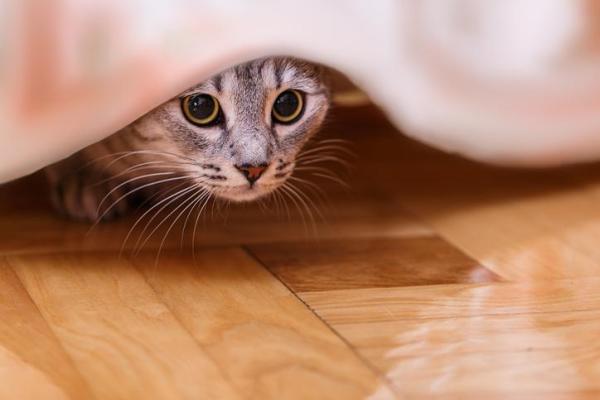Why is My Cat Acting So Weird?



See files for Cats
There are many things cats do which we consider weird. They are part of normal feline behavior to which cat guardians eventually adjust. Some of these are characteristic of cats as a species, others are particular to an individual cat. It doesn't mean they are necessarily unhealthy or signal a problem in their well-being. The type of behavior we define in this AnimalWised article as weird is that which is uncharacteristic of a healthy cat. Such strange or abnormal behavior could be highlighting either a physical or psychological problem which will need to be addressed.
If you as yourself, “Why is my cat acting weird?”, it can be very difficult to determine the underlying cause. It is, however, necessary, meaning taking our cat to the veterinarian is essential.
How to tell if your cat is sick
When our cat is acting weird, the first thing we need to consider is whether they are sick. Certain pathologies or health problems will have very specific indicative symptoms. For example, a cut or wound from trauma is often obvious. However, many symptoms are non-specific and make it difficult to clearly detect a disease. Some heavily imply there is a physiological problem, such as vomiting or diarrhea. Other symptoms may less obvious, but it doesn't mean they are any less serious:
- Reduced movement
- Spends more time lying down or hiding
- Decrease social interactions
- Reduce grooming behavior
- Weight loss
- Thinning coat
- Vomiting
None of the above weird behaviors point directly or conclusively to a particular disease. Often, they may not even seem like symptoms of illness, but just that the cat seems ‘out of sorts’. However, unusual behavior in cats will usually have some underlying cause, so it is worth noting any weird behavior. When we take our cat to the veterinarian for an examination, we need to relay our observations as they may assist in creating a diagnosis.
This abnormal behavior in cats may indicate they are incubating a disease. It may also be a sign of an underlying chronic condition which was previously asymptomatic, but is now producing symptoms as it advances. For example, kidney disease is something which may not provide any symptoms early on. However, as the organs begin to fail, the repercussions on the rest of the cat's system become evident. Unfortunately, since the symptoms are not easily observed, the damage can become extensive. A similar thing happens with problems such as inflammatory bowel disease.
How to know if a cat has a fever
One of the clearest signs your cat is unwell is fever. Feeling their skin alone will be a poor determiner of their core body temperature, the main sign of fever. This is why knowing how to take your cat's temperature at home is important. If your cat has a fever, you will need to take them to a veterinarian. However, you can read more background information with our article on fever in cats.
My cat is acting distant all of a sudden
Physical diseases are not the only reason a cat may be acting weird. Cats are very sensitive animals and any changes to their routine can generate stress and changes to their behavior. Common changes in a cat's life which result in alterations to their behavior include:
- Moving home
- A new member of the family
- Over-manipulation
- New noises (even those we cannot hear)
- Change in feeding routine
- New pets in the area
- Traumatic experience (e.g. veterinary visits)
Often we may be unable to determine the cause of stress in our cat. Their perception and understanding of the world is different to ours. There are many stressors affecting cats which seem innocuous to us. Regardless, if we see clear signs our cat is stressed, we will need to do something about it.
Symptoms of stress in cats
If you suspect that your cat has stress, these are some of the possible symptoms of stress in cats:
- They act weird/abnormal
- They hide from us
- Lack of appetite
- Overgrooming
- Bite themselves compulsively
- Urinates/defecates outside of the litter box
- Other stereotypies
These strange behaviors are most commonly associated with stress. However, they are also the same or similar to certain physical problems. For example, a cat with a urinary tract infection may urinate outside of their liter box. This is another reason why we need to go to a veterinarian to reach an adequate diagnosis.
Sress is treatable through modifications of their care, routine and environment. However, it can be difficult to determine the best course of action since every cat is an individual. Speaking to an ethologist or cat behaviorst is ideal.

My cat is weird after vaccination
When our cat is acting weird, we need to consider the general context. Sometimes there are specific instances which can lead to weird behaviors in your cat. One example we highlight is when a cat acts weird after getting a shot. Whether it is for rabies, Feline Calicivirus (FCV) or any other type of vaccination, it is possible your cat will behave strangely for the 24 hours after receiving the shot.
Altered behavior after vaccination is not very frequent, but it is possible and shouldn't cause any concern. The reason for it is likely a physical response to the vaccination itself, as well as an emotional response to being taken to the clinic and being injected.
In general, the cat may seem a little strange, but they should return to normal within 24 hours. If they continue acting weird after this time, you will need to take them to the veterinarian to ensure there is no physiological problem. To know more, you can read about some of the possible side effects of vaccinations in cats.
My cat is acting weird and meowing
Although we may be not speak the same language, vocalization in cats is an important means of communication. Despite its importance, it is not always well understood. To interpret the different types of meowing in cats, we need to look at the context of their behavior. If your cat is acting weird and meowing, it might manifest itself in the following ways:
- Shrill and prolonged vocalizations
- Inappropriate urination
- Increased aggression
- Overly affectionate
- Lying in odd postures
- Excessive rubbing against objects/persons
If your cat is exhibiting the above signs, it is likely they are in their heat period. This will affect them throughout their lives, but can begin as early as 4 months of age. When symptoms arise, it can be unexpected and disconcerting. It is a physiological process which will continue if intervention is not carried out.
Sterilization is recommended by veterinarians. Not only will it prevent strange behaviors in the cat, but it will help to safeguard their general well-being. This is because spaying a female cat decreases the risk of various diseases, as well as stabilizing their hormone production. To learn more you can look at our article on the benefits, disadvantages and price of feline sterilization.
My cat is acting weird and doesn't want to play
After reviewing the most common reasons why our cat is acting weird, one other thing we need to take into account is their stage of life. As with humans, cats will change their habits during their lifetime. For example, after kittens open their eyes and begin to walk, they will start to play energetically. However, after some time, this behavior will reduce.
Reduction of play activity is particularly noticeable in senior cats. This is in part due to the consequences of aging. The cat's joints and bones will become weakened, they will have less energy and they are more susceptible to degenerative diseases. For this reason, regular checkups every 6 to 12 months is recommended for all cats over the age of 6 years.
Another reason your cat may stop being interested in interaction is due to depression. If they are unhappy, they may lose their motivation. The reasons your cat is depressed are varied and can be difficult to determine. They may also be similar to the reasons your cat is stressed as not all cats will respond to the same stimuli in the same way. Discussing treatment options with your veterinarian is the best course of action.

Understanding feline behavior
While hiding is one of the strange behaviors which a cat may develop, the opposite can be weird also. For example, sometimes the cat becomes very clingy. They may also seem disinterested and lethargic. Knowing why your cat is acting differently to normal can be tricky. To understand why your cat is acting weird, you need to better know your cat. By better understanding our cat's behaviors and personality, we can better know what to do if they are acting weird.
To helps us understand feline behavior, you can take a look at the following subjects:
This article is purely informative. AnimalWised does not have the authority to prescribe any veterinary treatment or create a diagnosis. We invite you to take your pet to the veterinarian if they are suffering from any condition or pain.
If you want to read similar articles to Why is My Cat Acting So Weird?, we recommend you visit our Other health problems category.
- Alvarez, Rosana. Stress recognition in cats . Ateuves Magazine nº 27. pp. 28-31.







